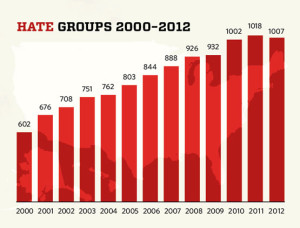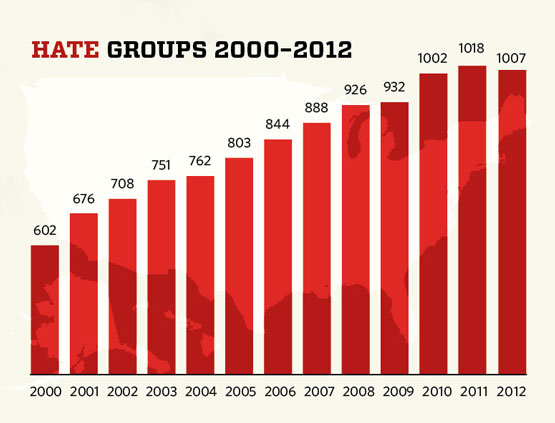
The topline numbers in the recent report from the Southern Poverty Law Center are not good. There are now more hard-right, antigovernment “Patriot” groups than there were at the movement’s previous heyday in the mid-1990s. The number of hate groups identified by the SPLC has been on a steady climb over the past dozen years.
Among other factors, the election and reelection of America’s first black president has fueled the growth of extremist groups. From the report:
“Since Obama’s first term, our numbers have doubled and now we’re headed to a second term, it’s going to triple,” one Virginia Klansman told WTVR-TV in Richmond. Daniel Miller, president of the secessionist Texas National Movement, said that his membership shot up 400% after Obama’s re-election. White News Now, a website run by white supremacist Jamie Kelso, said that it had had “an incredible year” in the run-up to the vote, reaching more people than ever.
Meanwhile, the paranoid ideas of these extremist groups have gained traction in recent years — what the SPLC has called the “mainstreaming of formerly marginal conspiracy theories.” One such theory centers on Agenda 21, a plan put forth by the U.N. and signed by President George H.W. Bush. The plan — in reality, a statement of goals lacking any enforcement mechanism — promotes sustainable development through, for example, environmental protection, altering patterns of consumption, and population control. The John Birch Society (yes, the group that accused President Eisenhower of being a communist and traitor) and others have pushed the idea that one day the federal government will use Agenda 21 for legal authority to ignore individual liberty and property rights and impose a collectivist system on the United States. To see how far this idea has been mainstreamed, just look at the official 2012 Republican Party platform, which declares: “We strongly reject the U.N. Agenda 21 as erosive of American sovereignty.”
In a previous post, I explored some of the delusional, racist paranoia coming from the extreme right on the gun issue. For some people it’s not easy to adjust to demographic changes, and unfortunately some media personalities and political figures are willing to exploit anxiety about them to advance their own causes and careers. Some people don’t like the idea of a black president, or the fact that white Americans may not be a majority of the population in a couple of generations.
To be clear, one need not be a bigot to express concerns about how best to integrate large numbers of immigrants. But racial and cultural anxieties do underlie those concerns for a segment of the white population. The most extreme identify as white nationalists. The adherents of this cause, historian Leonard Zeskind explains, are “dedicated to the proposition that those they deem to be ‘white’ own special rights: the right to dominate political institutions, the economy, and culture. They believe that a ‘whites-only’ nation exists in fact, if not in name. And they swear to a duty to create a whites-only nation-state on soil that was once the United States of America.”
In a recent article, I discussed these white nationalists, and what I see as their potential to weaken or even break the bonds that tie together Americans of different ethnic backgrounds:
[They] cling to an imagined definition of what America once was — an America that valued them because of the one thing no one can take from them: their whiteness. They fear that if America is not “white” then they will be second-class citizens.… These extremists need not turn us into a racialist, genocidal totalitarian state in order to cause serious damage to the fabric of our society. Just think of what a few more Timothy McVeigh-type attacks might do. We ignore their alienation at our peril.
Ian Reifowitz Ian Reifowitz is the author of Obama’s America: A Transformative Vision of Our National Identity. Twitter: @IanReifowitz
- Follow us on Twitter: @inthefray
- Comment on stories or like us on Facebook
- Subscribe to our free email newsletter
- Send us your writing, photography, or artwork
- Republish our Creative Commons-licensed content

